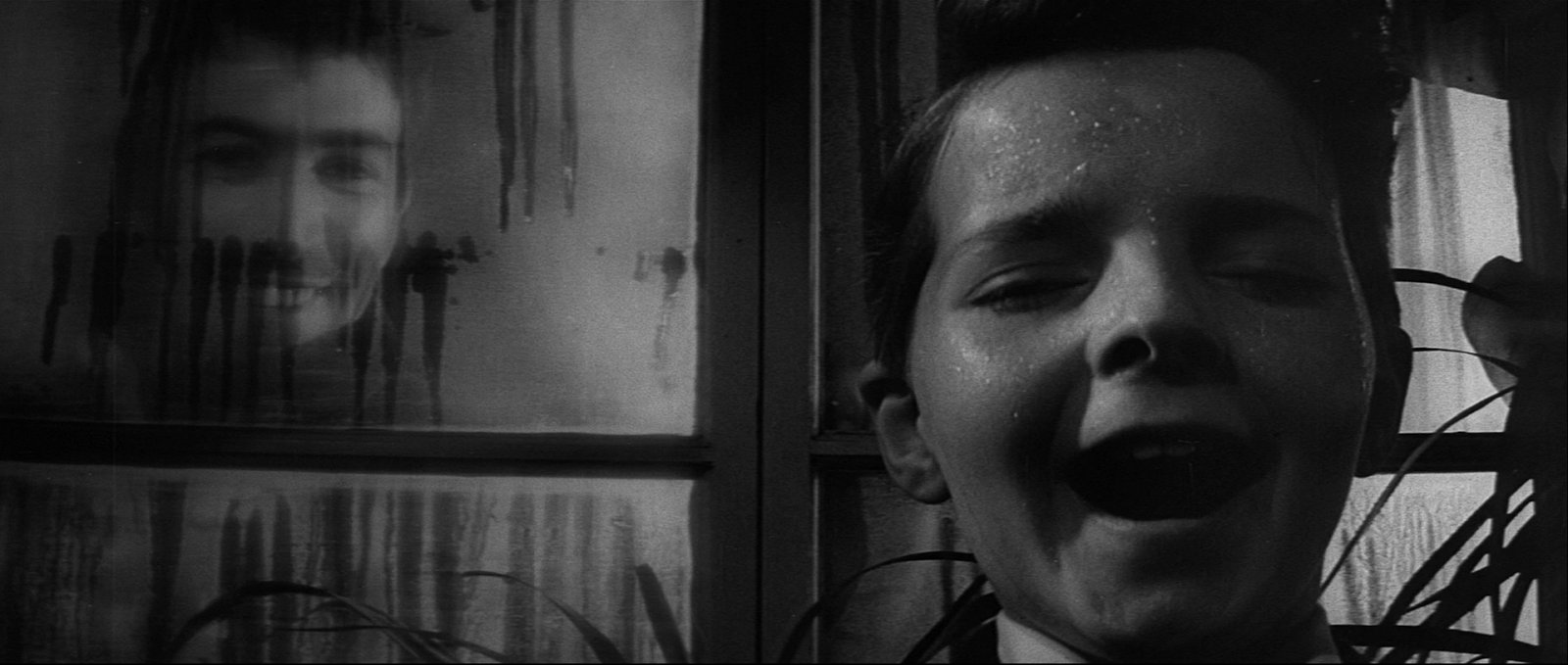Miss Giddens is given her first governess job by "The Uncle" (Michael Redgrave), a cold bon-vivant, who wants her to "handle everything" and "leave me alone." Arriving at the country estate, she finds a world alive with life...and some dead stuff, too. Isolated and buttoned-up (she's minister's daughter) she starts to suspect that her young little charges are more than they seem to be, then is finally convinced that they are in the thrall of the dead care-takers previously employed. Deborah Kerr treads a fine line between gentility and hysteria (one wonders whether we're watching a ghost story or a manifestation of her own worst fears and desires), and Michael Redgrave, appearing briefly, is the coldest of rakes. The stars of the film, though, are little Martin Stephens (fresh from playing the lead child in Village of the Damned) and Pamela Franklin, she, vibrating like a thing possessed (well...) and he, all-stillness and eyes that are fathoms deep. There has rarely been two kids as quietly malevolent as these two.
Then, too, are the presences of Peter Wyngarde (Britain's epitome of the degrading satyr) and Clytie Jessop, as the figments of Quint and Jessel, who have gone before as the caretakers of Flora and Miles, and, having died under mysterious circumstances, are merely ghostly presences. The image of Jessop, standing ethereally among the reeds of a lake still is one of the singularly creepy images in all of cinema for me. Freddie Francis did the outstanding deep-focus cinematography, and A.G. Ambler and John Cox, provided the ever-present sounds evocative of things both natural and not.
Talk about the road to Hell being paved with good intentions...
 The Innocents (Jack Clayton, 1961) is based on Henry James' classic story "The Turn of the Screw" co-scripted for the screen by none other than Truman Capote. Both deal with the attempts of a nanny to break her two young charges of the possession imposed on them by their former nanny and the old gardener---both of whom died under mysterious circumstances. The beauty of the story is that it is never stated outright--the possession may just be a figment of the nanny's sexually repressed imagination. And Deborah Kerr's sometimes feverish performance adds support to this argument. Add to the other side of the argument the eerily mature performances by Martin Stephens and Pamela Franklin as the children. Ms. Franklin grew up to give equally mature and accomplished roles later in her career--her performance in The Prime of Miss Jean Brodie rivalled the Oscar-winning one by Maggie Smith.
The Innocents (Jack Clayton, 1961) is based on Henry James' classic story "The Turn of the Screw" co-scripted for the screen by none other than Truman Capote. Both deal with the attempts of a nanny to break her two young charges of the possession imposed on them by their former nanny and the old gardener---both of whom died under mysterious circumstances. The beauty of the story is that it is never stated outright--the possession may just be a figment of the nanny's sexually repressed imagination. And Deborah Kerr's sometimes feverish performance adds support to this argument. Add to the other side of the argument the eerily mature performances by Martin Stephens and Pamela Franklin as the children. Ms. Franklin grew up to give equally mature and accomplished roles later in her career--her performance in The Prime of Miss Jean Brodie rivalled the Oscar-winning one by Maggie Smith.A great deal of the credit of The Innocents goes to director Jack Clayton who creates such a bloody eerie mood, in much the same way as Robert Wise did in The Haunting. Clayton also, I think, has a bird fetish. We were treated to a lot of cruddy birds in Clayton's over-produced, over-publicized, under-acted version of The Great Gatsby. But he does something neat here, there appear to birds all over the place--during the day, (and) at night, even. But you don't see them too often. They are merely a presence, like the two aberrations of the household.
The horror is done so well, so subtly in The Innocents, as opposed to the atrociousness of The Exorcist. Who would have thought that the sight of a woman dressed in black, sitting among the reeds in the distant haze could throw such cold at your back and make the roots of your hair tingle? That's the beauty of The Innocents, it does so much with so little, but when it pulls the stops out, the effect is damn near devastating.
Broadcast on KCMU-FM on January 21, 1977







No comments:
Post a Comment